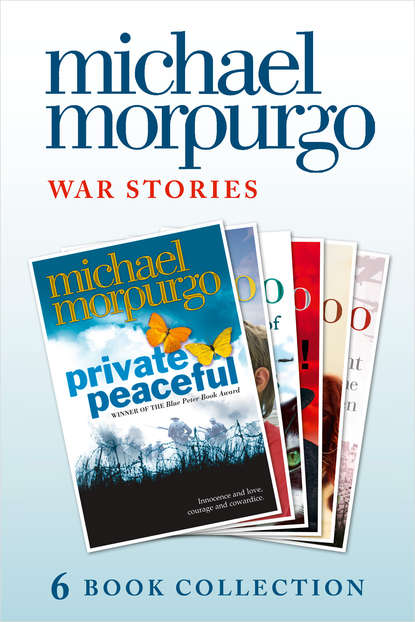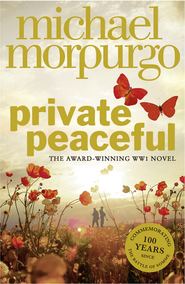По всем вопросам обращайтесь на: info@litportal.ru
(©) 2003-2025.
✖
Morpurgo War Stories
Настройки чтения
Размер шрифта
Высота строк
Поля
“More fool them,” Charlie said. “I’m not going, not ever. I’ll shoot a rat because it might bite me. I’ll shoot a rabbit because I can eat it. Why would I ever want to shoot a German? Never even met a German.”
Mother picked up my spoon and handed it to me. “Eat,” she said, and she patted my arm. “And don’t worry about it, Tommo, they can’t make you go. You’re too young anyway.”
“I’m nearly sixteen,” I said.
“You’ve got to be seventeen,” said Charlie. “They won’t let you join unless you are. They don’t want boys.”
So I ate my soup and said no more about it. I was disappointed at first that I hadn’t had my big moment, but as I lay in bed that night I was secretly more than a little relieved that I wouldn’t be going off to the war, and that by the time I was seventeen it would all be over anyway, as like as not.
A few weeks later the Colonel paid Mother a surprise visit, whilst Charlie and I were out at work. We didn’t hear about it until we got home in the evening and Molly told us. I thought something strange was going on as Mother was unusually preoccupied and quiet at supper. She wouldn’t even answer Big Joe’s questions. Then when Molly got up saying she felt like a walk, and suggested both Charlie and I came with her, I knew for sure something was up. It was a very long time since we’d been out together, just the three of us. If Charlie had asked me, I’d have said no for sure. But it was always more difficult for me to refuse Molly.
We went down to the brook, just like we’d done in the old days whenever we’d wanted to be alone together, where Molly and I had met up so often when I’d been their go-between postman. Molly didn’t tell us until we were sitting either side of her on the river bank, until she had taken each of us by the hand.
“I’m breaking a promise I made to your mother,” she began. “I so much don’t want to tell you this, but I must. You have to know what’s going on. It’s the Colonel. He came in and told her this morning. He said he was only doing what he called his ‘patriotic duty'. He told us that the war was going badly for us, that the country was crying out for men. So he’s decided that now is the time for every able-bodied man who lives or works on his estate, everyone who can be spared, to volunteer, to go off to the war and do his bit for King and country. The estate will just have to manage without them for a while.” I felt Molly’s grip tighten on my hand, and a tremor come into her voice. “He said you’ve got to go, Charlie, or else he won’t let us stay on in the cottage. Your mother protested all she could, but he wouldn’t listen. He just lost his temper. He’ll put us out, Charlie, and he won’t go on employing your mother or me unless you go.”
“He wouldn’t do that, Moll. It’s just a threat,” Charlie said. “He can’t do it. He just can’t.”
“He would,” Molly replied, “and he can. You know he can. And when the Colonel gets it into his head to do something, and he’s in the mood to do it, he will. Look what he did to Bertha. He means it, Charlie.”
“But the Colonel promised,” I said. “And his wife did too before she died. She said she wanted Mother looked after. And the Colonel said we could stay on in the cottage. Mother told us.”
“Your mother reminded him of that,” Molly replied. “And d’you know what he said? He said it had never been a promise as such, only his wife’s wish, and that anyway the war had changed everything. He was making no exceptions. Charlie has to join up or we’ll be out of the cottage at the end of the month.”
We sat there holding hands, Molly’s head on Charlie’s shoulder, as evening fell around us. Molly was sobbing quietly from time to time but none of us spoke. We didn’t need to. We all knew there was no way out of this, that the war was breaking us apart, and that all our lives would be changed for ever. But at that moment, I treasured Molly’s hand in mine, treasured this last time together.
Suddenly, Charlie broke the silence. “I’ll be honest, Moll,” he said. “It’s been bothering me a lot just lately. Don’t get me wrong. I don’t want to go. But I’ve seen the lists in the papers — y’know, all the killed and the wounded. Poor beggars. Pages of them. It hardly seems right, does it, me being here, enjoying life, while they’re over there. It’s not all bad, Moll. I saw Benny Copplestone yesterday. He was sporting his uniform up at the pub. He’s back on leave. He’s been a year or more out in Belgium. He says it’s all right. ‘Cushy,’ he called it. He says we’ve got the Germans on the run now. One big push, he reckons, and they’ll all be running back to Berlin with their tails between their legs, and then all our boys can come home.”
He paused, and kissed Molly on her forehead. “Anyway, it looks like I haven’t got much choice, have I, Moll?”
“Oh Charlie,” Molly whispered. “I don’t want you to go.”
“Don’t worry, girl,” Charlie said. “With a bit of luck I‘ll be back to wet the baby’s head. And Tommo will look after you. He’ll be the man about the place, won’t you, Tommo? And if that silly old fart of a Colonel sticks his lousy head in our front door again when I’m gone, shoot the bastard, Tommo, like he shot Bertha.” And I knew he was only half-joking, too.
I don’t believe I even thought about what I said next. “I’m not staying,” I told them. “I‘m coming with you, Charlie.”
They both tried all they could to dissuade me. They argued, they bullied, but I would not be put off, not this time. I was too young, Charlie said. I said I was sixteen in a couple of weeks and as tall as he was, that all I had to do was shave and talk deeper and I could easily be taken for seventeen. Mother wouldn’t let me go, Molly said. I said I’d run away, that she couldn’t lock me up.
“And who’ll be there to look after us if you both go?” Molly was pleading with me now.
“Who would you rather I look after, Molly,” I replied. “All of you at home who can perfectly well look after yourselves? Or Charlie, who’s always getting himself into nasty scrapes, even at home?” When they had no answer to this, they knew I’d won, and I knew it too. I was going to fight in the war with Charlie. Nothing and no one could stop me now.
I’ve had two long years to think on why I decided like that, on the spur of the moment, to go with Charlie. In the end I suppose it was because I couldn’t bear the thought of being apart from him. We’d lived our lives always together, shared everything, even our love for Molly. Maybe I just didn’t want him to have this adventure without me. And then there was that spark in me newly kindled by those scarlet soldiers marching bravely up the High Street in Hatherleigh, the steady march of their feet, the drums and bugles resounding through the town, the sergeant major’s stirring call to arms. Perhaps he had awoken in me feelings I never realised I’d had before, and that I had certainly never talked about. It was true that I did love all that was familiar to me. I loved what I knew, and what I knew was my family, and Molly, and the countryside I’d grown up in. I did not want any enemy soldier ever setting foot on our soil, on my place. I would do all I could to stop him and to protect the people I loved. And I would be doing it with Charlie. Deep down though, I knew that, more than Charlie, more than my country or the band or the sergeant major, it was that toothless old woman taunting me in the square. “Y’ain’t a coward, are you? Y’ain’t a coward?”
The truth was that I wasn’t sure I wasn’t, and I needed to find out.
I had to prove myself. I had to prove myself to myself.
Two days later, two days of parrying Mother’s many attempts to keep me from going, we all went off together to Eggesford Junction Station where Charlie and I were to catch the train to Exeter. Big Joe had not been told anything about us going off to war. We were going away for a while, and we’d be back soon. We didn’t tell him the truth, but we told him no lies either. Mother and Molly tried not to cry because of him. So did we.
“Look after Charlie for me, Tommo,” Molly said. “And look after yourself too.” I could feel the swell of her belly against me as we hugged.
Mother told me to promise to keep clean, to be good, to write home and to come home. Then Charlie and I were on the train — the first train we’d ever been on in our lives, and we were leaning out of the window and waving, only pulling back spluttering and coughing when we were engulfed suddenly in a cloud of sooty smoke. When it cleared and we looked out again, the station was already out of sight. We sat down opposite each other.
“Thanks, Tommo,” said Charlie.
“For what?” I said.
“You know,” he replied, and we both looked out of the window. There was no more to say about it. A heron lifted off the river and accompanied us for a while before veering away from us and landing high in the trees. A startled herd of Ruby Red cows scattered as we passed by, tails high as they ran. Then we were in a tunnel, a long dark tunnel filled with din and smoke and blackness. It seems like I’ve been in that tunnel every day since. So Charlie and I went rattling off to war. It all seems a very long time ago now, a lifetime.
(#ulink_afbc9e7e-b43a-53ef-b56d-82e0537da4fe)
I keep checking the time. I promised myself I wouldn’t, but I can’t seem to help myself. Each time I do it, I put the watch to my ear and listen for the tick. It’s still there, softly slicing away the seconds, then the minutes, then the hours. It tells me there are three hours and forty-six minutes left. Charlie told me once this watch would never stop, never let me down, unless I forgot to wind it. The best watch in the world, he said, a wonderful watch. But it isn’t. If it was such a wonderful watch it would do more than simply keep the time — any old watch can do that. A truly wonderful watch would make the time. Then, if it stopped, time itself would have to stand still, then this night would never have to end and morning could never come. Charlie often told me we were living on borrowed time out here. I don’t want to borrow any more time. I want time to stop so that tomorrow never comes, so that dawn will never happen.
I listen to my watch again, to Charlie’s watch. Still ticking. Don’t listen, Tommo. Don’t look. Don’t think. Only remember.
“Stand still! Look to your front, Peaceful, you horrible little man!” …“Stomach in, chest out, Peaceful.” …“Down in that mud, Peaceful, where you belong, you nasty little worm. Down!” … “God, Peaceful, is that the best they can send us these days? Vermin, that’s what you are. Lousy vermin, and I’ve got to make a soldier of you.”
Of all the names Sergeant “Horrible” Hanley bellowed out across the parade ground at Etaples when we first came to France, Peaceful was by far the most frequent. There were two Peacefuls in the company of course, and that made a difference, but it wasn’t the main reason. Right from the very start Sergeant Hanley had it in for Charlie. And that was because Charlie just wouldn’t jump through hoops like the rest of us, and that was because Charlie wasn’t frightened of him, like the rest of us were.
Before we ever came to Etaples, all of us, including Charlie and me, had had an easy ride, a gentle enough baptism into the life of soldiering. In fact we’d had several weeks of little else but larks and laughter. On the train to Exeter, Charlie said we could easily pass for twins, that I’d have to watch my step, drop my voice, and behave like a seventeen-year-old from now on. When the time came, in front of the recruiting sergeant at the regimental depot, I stood as tall as I could and Charlie spoke up for me, so my voice wouldn’t betray me. “I’m Charlie Peaceful, and he’s Thomas Peaceful. We’re twins and we’re volunteering.”
“Date of birth?”
“5
October,” said Charlie.
“Both of you?” asked the recruiting sergeant, eyeing me a little I thought.
“Course,” Charlie replied, lying easily, “only I’m older than him by one hour.” And that was that. Easy. We were in.
The boots they gave us were stiff and far too big — they hadn’t got any smaller sizes. So Charlie and I and the others clomped about like clowns, clowns in tin hats and khaki. The uniforms didn’t fit either, so we swapped about until they did. There were some faces from home we recognised in amongst the hundreds of strangers. Nipper Martin, a little fellow with sticking-out ears, who grew turnips on his father’s farm in Dolton, and who played a wicked game of skittles up at The Duke. There was Pete Bovey, thatcher and cider drinker from Dolton too, red-faced and with hands like spades, who we’d often seen around the village in Iddesleigh, thumping away at the thatch, high up on someone’s roof. With us too was little Les James from school, son of Bob James, village rat catcher and wart charmer. He had inherited his father’s gifts with rats and warts and he always claimed to be able to know whether it was going to rain or not the next day. He was usually right too. He always had a nervous tic in one eye that I could never stop looking at when we were in class together.
At training camp on Salisbury Plain, living cheek by jowl, we all got to know each other fast, though not necessarily to like one another — that came later. And we got to know our parts, too, how to make believe we were soldiers. We learnt how to wear our khaki costumes — I never did get to wear the scarlet uniform I’d been hoping for — how to iron creases in and iron wrinkles out, how to patch and mend our socks, how to polish our buttons and badges and boots. We learnt how to march up and down in time, how to about-turn without bumping into one another, how to flick our heads right and salute whenever we saw an officer. Whatever we did, we did together, in time — all except for little Les James who could never swing his arms in time with the rest of us, no matter how much the sergeants and corporals bellowed at him. His legs and arms stepped and swung in time with each other, and with no one else, and that was all there was to it. He didn’t seem to mind how often they shouted at him that he had two left feet. It gave us all something to laugh about. We did a lot of laughing in those early days.
They gave us rifles and packs and trenching shovels. We learnt to run up hills with heavy packs, and how to shoot straight. Charlie didn’t have to be taught. On the rifle range he proved to be far and away the best shot in the company. When they gave him his red marksman’s badge I was so proud of him. He was pretty pleased himself, too. Even with the bayonets it was still a game of make-believe. We’d have to charge forward screaming whatever obscenities we knew — and I didn’t know many, not then — at the straw-filled dummies. We’d plunge our bayonets in up to the hilt, swearing and cursing the filthy Hun as we stabbed him, twisting the blade and pulling it out as we’d been taught. “Go for the stomach, Peaceful. Nothing to get hung up on in there. Jab. Twist. Out.”
Everything in the army had to be done in lines or rows. We slept in long lines of tents, sat on privies in rows. Not even the privy was private, I learnt that very quickly. In fact nowhere was private any more. We lived every moment of every day together, and usually in lines. We lined up together for shaves, for food, for inspections. Even when we dug trenches, they had to be in lines, straight trenches with straight edges, and we had to dig fast, too, one company in competition with another. We poured sweat, our backs ached, our hands were permanently raw with blisters. “Faster!” the corporals shouted. “Deeper! You want to get your head blowed off, Peaceful?”
“No, Corporal.”
“You want to get your arse blowed off, Peaceful?”
“No, Corporal.”
“You want to get your nuts blowed off, Peaceful?”
“No, Corporal.”











